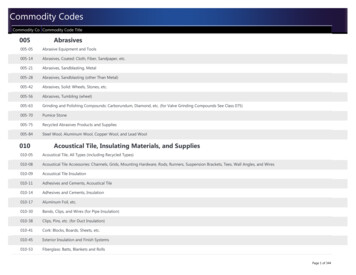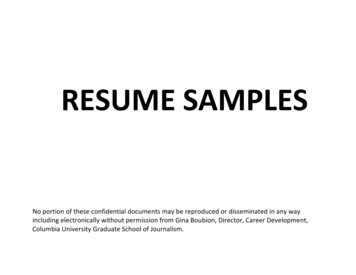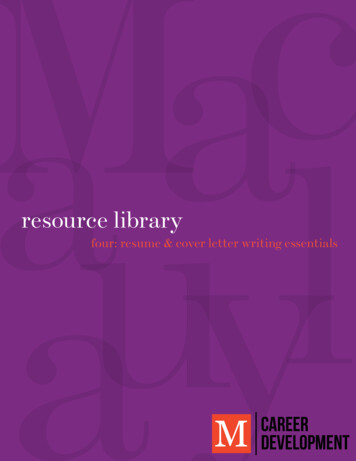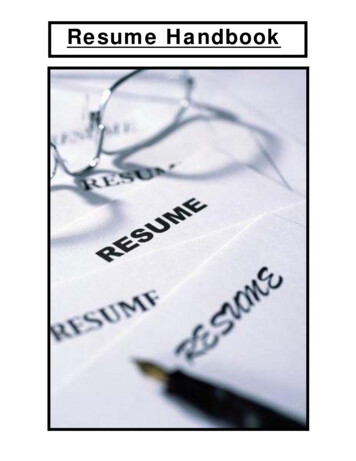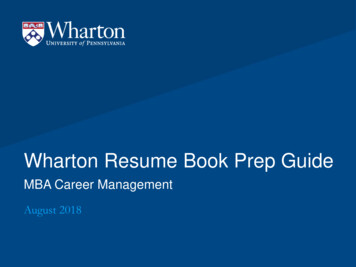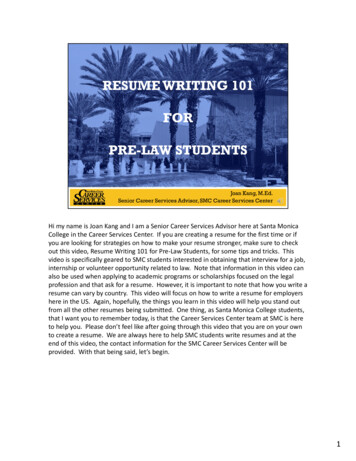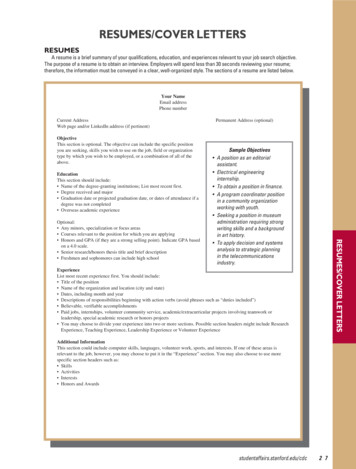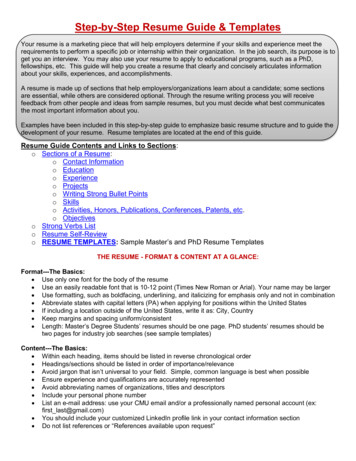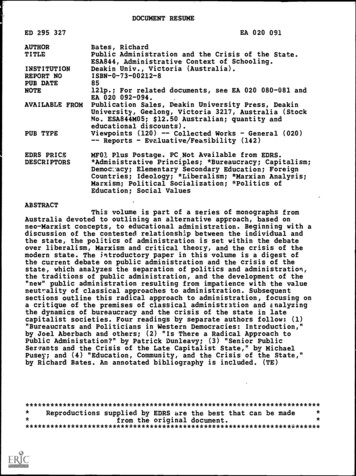
Transcription
DOCUMENT RESUMEEA 020 091ED 295 327AUTHORTITLEINSTITUTIONREPORT NOPUB DATENOTEAVAILABLE FROMPUB TYPEEDRS PRICEDESCRIPTORSBates, RichardPublic Administration and the Crisis of the State.ESA844, Administrative Context of Schooling.Deakin Univ., Victoria (Australia).ISBN-0-73-00212-885121p.; For related documents, see EA 020 080-081 andEA 020 092-094.Publication Sales, Deakin University Press, DeakinUniversity, Geelong, Victoria 3217, Australia (StockNo. ESA844M05; 12.50 Australian; quantity andeducational discounts).Viewpoints (120)Collected Works - General (020)Reports - Evaluative/Feasibility (142)MFO1 Plus Postage. PC Not Available from EDRS.*Administrative Principles; *Bureaucracy; Capitalism;Democracy; Elementary Secondary Education; ForeignCountries; Ideology; *Liberalism; *Marxian Analysis;Marxism; Political Socialization; *Politics ofEducation; Social ValuesABSTRACTThis volume is part of a series of monographs fromAustralia devoted to outlining an alternative approach, based onneo-Marxist concepts, to educational administration. Beginning with adiscussion of the contested relationship between the individual andthe state, the politics of administration is set within the debateover liberalism, Marxism and critical theory, and the crisis of themodern state. The introductory paper in this volume is a digest ofthe current debate on public administration and the crisis of thestate, which analyzes the separation of politics and administration,the traditions of public administration, and the development of the"new" public administration resulting from impatience with the valueneutrality of classical approaches to administration. Subsequentsections outline this radical approach to administration, focusing ona critique of the premises of classical administration and analyzingthe dynamics of bureaucracy and the crisis of the state in latecapitalist societies. Four readings by separate authors follow: (1)"Bureaucrats and Politicians in Western Democracies: Introduction,"by Joel Aberbach and others; (2) "Is There a Radical Approach toPublic Administation?" by Patrick Dunleavy; (3) "Senior PublicServants and the Crisis of the Late Capitalist State," by MichaelPusey; and (4) "Education, Community, and the Crisis of the State,"by Richard Bates. An annotated bibliography is included. ***************************Reproductions supplied by EDRS are the best that can be made**from the original ******************************
ESA844 Administrative Context of SchoolingPublic Administration andthe Crisis of the StateRichard BatesRIS0474 NLnCq01'U.S. DEPARTMENT OF EDUCATIONOffice of Educational Research and ImprovementEDUCATIONAL RESOURCES INFORMATIONCENTER (ERIC)eV/'This document h-s been reproduced as'IPoriginating it.0 Minor changes have been made to improvereproduction Quality411111"PERMISSION TO REPRODUCE THISMATERIAL IN MICROFICHE ONLYHAS BEEN GRANTED BYreceived from the person or organizationPoints of view or opinions stated in this docu-ment do not necessarily represent officialOERI posibcn or policy.TO THE EDUCATIONAL RESOURCESINFORMATION CENTER (ERIC)."NMI
ESA844 Administrative Context of SchoolingPublic Admilistration andthe Crisis of the StateRichard BatesDeakin UniversityA. .Deakin UniversityVictoria
Published by Deakin University, victoria 3217Distributed by Deakin University PressFirst published 198510 Deakin University 1935Edited, designed and typeset by Deakin University Production UnitPrinted by Deakin University PrinteryNational Library of AustraliaCataloguinginpublication dataBates, Richard J., 1941 Public Administration and the crisis of the state.Bibliography.ISBN 0 7300 0212 8.1. Education and state. I. Deakin University. School of Education. Open CampusProgram.11. Title. III. Title: Administrative context of schooling.379This book forms part of the ESA844 Administrative Context of Schooling course offeredby the School of Education in Deakin University's Open Campus Program. It has beenprepared by Richard Bates for the ESA844 Administrative Context of Schooling courseteam, whose members are:Course teamLawrence AngusRichard Bates (chairperson)Diana Macmillan (course developer)Fazal RizviPeter WatkinsConsultantsPeter Musgrave, Monash UniversityBill Hannan, Victorian Secondary Teachers AssociationHugh Watson, ACT Schools AuthorityThe course includes:Richard Bates, Liberalism, Marxism and the Struggle for the Stale. Prolegomena to the Studyof Public AdministrationRichard Bates, Public Administration and the Crisis of the StateBi II Hannan, Assessment and Evaluation in SchoolingP.W. Musgrave, Curricular Decisions in their Administrative ContextsPeter Watkins, Agency and Structure: Dialectics in the Administration of EducationHugh Watson, The Democratisation of EducationThese books are available from Deakin University Press. Deakin University, Victoria 3217Students enroPed in the course are also supplied with a guide to the course.4
iiiSeries introductionIt is not possible to understand the nature of educational administration withoutunderstanding the broader context of public administration or, further, the socialand political debate over the nature of the state, civil society and the economy,and their relationships. The series of volumes of which this book is a part addressesthese various issues. Beginning with a discussion of the contested relationshipbetween the individual and the state, the politics of administration is set withinthe debate over liberalism, Marxism and critical theory, and the nature of the crisisof the modern state. The impact of this crisis on public administration is thenexamined, especially in terms of the 'new' public administration and the notionof public good. An examination of educational administration follows, as do studiesof the administrative context e curriculum and of evaluation. Finally, a discussionof the dialectical nature of educational administration is presented.The introductory essay of each volume is a digest of current debate and a contribution to it. So that readers may enter that debate rapidly key readings areappended, as is an annotated bibliography of key works in the field. We hopethat this presentation of the debate will encourage others to join in the explorationof such issues in educational administration.Richard J BatesCourse team 'chairperson5
ContentsSeries introductionPublic administration and the crisis of the stateIntroductionThe separation of politics and administrationThe traditions of public administrationThe shaking of the foundationsNew directions in public administrationFact, value, effectiveness and expertise: The myth of managementThe dynamics of bureaucracyPublic administration and the crisis of th stateWhat then shall we do?iii1347131619232627Reference;ReadingsI Bureaucrats and politicians in Western democracies: Introdm (ion 39Joel Aberbach, Robert Putnam and Bert Rockman582 Is there a radical approach to public administration?Patrick Dunleavy713 Senior public servants and the crisis of the late capitalist stateMichael Pusey4 Education, community and the crisis of the state90Richard BatesAnnotated bibliographyAbout the authorAcknowledgements6
Public administration and the crisis ofthe stateAVAVAVAVAAVAVA
3IntroductionThe study of public administration is a study of both politics and organisation. Traditionally these two aspects have been regarded as conceptually,if not practically, distinct. The foundations of the field are laid on thedichotomies that flow from this distinction: those of fact and value, endsand means, charisma and rationality, policy and execution, democracy andmanagement. So deeply engrained are these divisions within the field thatHeady, after an extensive review of public administration in various culturescould claim that:With few exceptions, there is common agreement transcending differencesin political ideology, culture, and style, that bureaucracy should be basi-cally instrumental in its operation that it should serve as agent and notas master. It is almost universally expected that the bureaucracy be sodesigned and shaped as to respond willingly and effectively to policy leader-ship from outside its own ranks. The idea that bureaucratic officialdom,either civil or military, or both together, should for any extended periodof time constitute the ruling class in a political system is generally rejected.The pditical elite may include members of the civil or military bureaucracies, but should not consist exclusively or even primarily of bureaucraticofficials. Even in regimes in which a bureaucratic elite is clearly in a positionof political dominance, it will rarely claim that this is the way things shouldbe; instead, it will usually insir. that such a situation can be justified onlytemporarily under unusual circumstances . All agree that the state bureaucracy should be responsible to the political leadership, however intimatelyit may be brought into the process of decision making by the will of thepolitical elite.(Heady 1984, pp. 407-8)This is not to say, as Heady recognises, that the apparent consensuson the way things should be is a guarantee that they will actually be thatway. Indeed, there are grounds for believing that the distinction is a carefully sustained mythology which protects the interests of both politiciansand administrators by keeping many potentially troublesome issues outof the public arena, effectively depoliticising them by defining them asmatters of administrative rather than political concern. This process suitsadministrators and politicians alike for it depoliticises many issues whichmight otherwise prove distracting for politiciins and it allows administratorsto deal with such issues on a routine basis, thus giving them greater controlover their administration and its relationship with the public. As Wilenskiputs it:It has, however, served the purposes of both administrators and politicians. to maintal. the myth of the separation of politics and administration(and thus, incidentally, obscure the purposes of administrative reform). Themyth allows politicians to concentrate on electoral politics and other aspectsof their roles. It allows administrators to engage in politics and in policymaking without being held accountable politically for the outcomes of theiractions.(Wilenski 1979, p.349)This mythology also helps to sustain the legitimacy of politics and administration and paper over the significant tensions which arise from the oppo-sition of the principles of democratic government and administrativeorganisation. This opposition is represented in the dichotomies referred8
4to above and is usually addressed through the idea of 'balance' betweenpolitical and administrative forces. Weber, in his discussions of the relationship between pond, and administration in Germany following the FirstWorld War, was n.,:lt concerned that the overtowering' impact ofbureaucracies was balanced by the development of a parliamentary processwhich encouraged the emergence of essentially charismatic leaders capableof instructing the administrative apparatus of the state. However, it seemsclear in retrospect that the history of public administration in the twentieth century is very much the history of the development of the 'overtowering bureaucracy' that Weber both admired and feared.The development of administrative technique was initially concentratedin the field of industry where it was particularly suited to the structuresof control demanded by the development of industrial capitalism (seeBraverman 1974). However, while the development of 'administrativescience' as it was to become known, was more quickly embraced by businessthan by government the twin principles it promised, those of efficiency andcontrol, together with its claim to be the epitome of rational organisation,made it inevitable that similar principles would be applied to public administration. Indeed the claims of bureaucracy to rationality, efficiency andcontrol proved irresistible. What was good for business was, it was claimed,good for government. Woodrow Wilson, one of the earliest advocates ofa public administration based upon such principles, claimed in 1887 that the field of administration is a field of business' (Wilson 1953, p. 71).The history of public administration in the twentieth century is, therefore, very much the :istory of the application and development of administrative science to the work of government. Indeed, government is moreand more identified with the state bureaucracies that investigate, shapeand direct so much of public and private life. There are grounds, therefore, for believing that the balance between politics and administration thatWeber sought through a revitalised political system has yet to be achieved.What Weber feared, the domination of politics by administration, seems,in the modern world, much more likely.The failure of modern societies to develop political institutions that areas substantial as contemporary administrative agencies is a'rnajor factorin the crisis of the state. It is a failure that lies at the heart of the crisisin public administration. It is a failure that lies at the heart of the crisisin education. This monograph is an attempt to understand why this shouldbe so and to outline some of the attempts being made to rectify our understanding and practice of public administration, especially as it :elates toeducation.The separation of politics and administrationThe need of the state for an administrative apparatus is directly derivedfrom the fundamental characteristic of every ,political association: that isupon the use of force. According to Weber in 1919:'Every state is founded on force', said Trotsky at Brest-Litovsk. That is indeedright. If no social institutions existed which knew the use of violence, thenthe concept of 'state' would be eliminated . Of course force is certainlym
5not the normal or the only means of the state nobody says that but forceis a means specific to the state . a state is a human community that (successfully) claims the monopoly of the legitimate use offorce within a given territory.(Gerth and Mills 1970, p.78)In the modern state, suggests Wcbcr, force is exercised by politicallydominant power through two major means.Organized domination, which calls for continuous administration, requiresthat human conduct be conditioned to obedience towards those masters whoclaim to be the bearers of legitimate power. On the other hand, by virtueof this obedience, organized domination requires the control of those materialgoods which in a given case are necessary for the use of physical violence. The administrative staff, which externally represents the organizationof political domination, is, of course, like any other organization, boundby obedience to the power-holder and not alone by the concept of legitimacy.(Gerth & Mills 1970, p. 80)The state requires, according to Weber, a system of continuous administration in order to maintain its organised domination of a particular ter-ritory. Two main tasks preoccupy this administration. Firstly thedevelopment of systematic procedures through which 'human conduct (can)be conditioned in obedience'. Secondly, the development of systematicmeans of physical violence. If the first is sufficiently effective, the secondwill seldom be called into use. It is noteworthy that this system of administration is required to be neutral, or in Weber's words have a strong senseof integrity, in relation to the directions of the power holders. That is, theadministration must be both able and willing to serve whatever mastersare elected or achieve power and be independent of the struggles for powerthat are the preoccupation of would-be power holders. As the state becomesmore complex the system of continuous administration increases and standsover and against party political struggles which Weber suggests '. . arestruggles for the patronage of office, as well as struggles for objective goals'(Gerth and Mills 1970, p. 87). Indeedthe development of modern officialdom into a highly qualm d, professionallabor force, specialized in expertness through long years of preparatorytraining, stands opposed to all these (party political] arrangements. Modernbureaucracy.in the interest of integnty has developed a high sense of statushonor . And without such integrity, even the purely technical 'unctionsof the state apparatus would be endangered.(Genii & Mills 1970, pp. 87-8)For Wcbcr the career of the bureaucrat stands in sharp contrast to the dispensability of politicians.The development of politics into r organization which demanded trainingmethods of this struggle as developedin the struggle for power, and inby modern party policies, deters al the separation of public functionariesinto two categories, which, however, are by no means rigidly but nevertheless distinctly sep- sued. These categories are 'administrative officials on theone hand, and 'political' officials on the other. The 'political' officials, in thegenuine sense of the word, can regularly and externally be recognised bythe fact that they can be transferred any time at will, that they can be dis1issed, or at least temporarily withdrawn.(Gerth & Mills 1970, p. 90)
6The role of the politician is, according to Weber, the passionate pursuitof power; not always by the best of means. Indeed Weber in his discussionof 'Politics as a vocation' makes much of the ethical dile:nmas involved inpursuing worthy ends through unworthy means and of the 'irrationality'involved in the constant conflict of beliefs in the political arena. Weber'sdiscussion of the difficulties of these valtie conflicts and their political resolution is largely a descriptive, even taxonomic account of various historical situations. While his accounts are both learned and interesting he failsto provide an account of political action which is anywhere near as definitl,eas his account of administrative action. While Weber discusses the variousways by which politicians assert their power and legitimacy he regards thepolitical as an essentially irrational, emotional pursuit which he contrastsvividly with the rationality, impartiality and integrity of administration.For instance:According to his proper vocation, the genuine official . will not engagein politics. Rather, he should engage in impartial 'administration' . Totake a stand, to be passionate . is the politician's element, and above allthe clement of the political leader. His conduct is subject to quite a different,indeed, exactly the opposite, principle of responsibigty from that of thc civilservant. The honor of the civil servant is vested in his ability to executeconscientiously the order of the superior authorities, exactly as if the orderagreed with his own conviction. This holds even if the order appears wrongto him and if, despite the civil servant's remonstrances, the authority insistson thc order .The honor of the political leader, of the leading statesman,however, lies precisely in an exclusive personal responsibility for what he does,a responsibility he cannot and must not reject or transfer.(Gerth & Mills 1970, p.95)For Weber then, there was a sharp contrast between the nature of politicsand the nature of administration. Politics was the province of power seekerswho pursued not only 'objective goals' but also the 'patronage of office'.Even the 'objective goals' were seen by Weber as being chosen on an essentially irrational basis 'bccausc the various value spheres of the world standin irreconcilable conflict with each other' (Gcrth & Mills 1970, p. 147). Ultimately in the world of politics 'We1anschauungen clash, world views amongwhich in the end one has to make a choice' (Gerth & Mills 1970, p. 117).Ultimately the determination of which world view is to prevail is not, inthe world of politics, a matter of rationality but of power for 'the decisivemeans for politics is violence' ( Gerth & Mills 1970, p. 121). On the otherhand administration in its bureaucratic form is regarded as a significantshift towards the application of rationality to the organisation of social lilt.Indeed Weber in 1922 went as far as to claim that as a result of its technical superiority 'the march of bureaucracy has destroyed structures of domination which had no rational character . '( Gerth & Mills 1970, p. 244).In its employment of rational legal structures of rules, in its appilicationof the expertise of professionals to administrative problems, in its hierarchyof office and its impartiality of examiniation and treatment of cases, thebureaucracy epitomised fir Weber the notion of rationality.11
7What merges from Wcber's analysis, as Maclntyrc (1981) points out,is a sociological consequence of the philosophical inhcritancc of the Enlight-enment and especially of its thcorics of cmpiricism on thc one hand andtrnotivism on the other. AS far as empiricism is concerned the attempt wasone flaying bare the physiological and physical mechanisms which underlieaction' in order to develop a notion of mechanical explanation: 'a concepticrof invariances specified by law-like generalisations' (MacIntyre 1981, p. 79).The difficulty with such a notion it its incompatibility with any explanation of action based upon moral imperativcs. Thus as Maclntyre suggcstswhen Kant recognises that there is a deep incompatibility between anyaccount of actor which recognises the role of moral imperatives in governingaction and any such mechanical type of explanation, he is compelled to theconclusion that actions obeying and embodying moral imperatives must befrom the standpoint of science inexplicable and unintelligible.(Maclntyre 1981, p.79)The result of the widespread acceptance of a mechanical, empiricist viewof rationality and action is thcrcfore the divorce of fact from value andthc relegation of moral questions to a separate province of ethics dominated by the theory of emotivisn. 'Emotivism', suggcsts MacIntyre in auseful definition, 'is thc doctrine that all evaluative judgmcnts and morespecifically all moral judgmcnts arc nothing but expressions of prcfcrcncc,expressions of attitude or fecling, insofar as they are moral or cvaluativemoral judgments, being expresin character' (1981, p. 11). As a resuItsions of attitude or fecling, arc neither true nor false; and agrccmcnt inmoral judgment is not to be sccurcd by any rational method, for them arcnonc' (1981, pp. 11-12).It can readily be seen then that Wcber's separation of politics from administration and his application of the.dichotomies of fact and value, cnds andmoans, charisma and rationality, policy and execution, dcmocracy andmanagement, power and authority, arc almost inescapable outcomes ofhis acccptance of thc canons of cmpiricism and emotionalism laid downduring the Enlightenment. In this Wcbcr was a creature of his times. Aswell as informing Webee's work o-,ese ideas have lbrmcd thc basis of thepracticc and study of public administration from its inception.The traditions of public administrationThe academic study of public administration is an off-shoot of politicalsciencc. While it cstablished its independence as a field of study in the 1920sit h.41 its roots in an earlier period. Pcrhaps the most important essay onblic administration of this early period, one which foreshadowed manyof thc preoccupations of thc field, was that published by Woodrow Wilsonin 1887. In this paper Wilson sought to establish the importance of thestudy of public administration, to describe the main features of publicadministration as it had developed in Europe and to sct out thc majorconcerns that should guide the development of a'seicnec ofadministration'in thc United Sudo.12
8Beginning with a discussion of the historical enlargement of governmentfunctions and agencies during the nineteenth century Wilson argues thatthe debates of principle involved in political philosophy have to be joinedby debates over administrationThe weightier debates of constitutional principle are even yet by no meansconcluded; but they are no longer of more immediate practical moment thanquestions of administration. It is getting to be harder to run a constitutionthan to frame one.(Wilson1953, p. 67)As greater demands are placed on government and as governmentresponds by increasing the size and complexity of its intervention in theeveryday affairs of business, commerce and private life, so the need fora science of administration becomes urgent.There is scarcely a single duty of government which was once simple whichis not now complex; government once had but a few masters; it now hasscores of masters. Majorities formerly only underwent government; theynow conduct government. Where government once might follow the whimsof a court, it must now follow the views of a nation.And those views are steadily widening to new conceptions of state duty;so that, at the same time that the functions of government are every daybecoming more complex and difficult, they are also vastly multiplying innumber . This is why there should be a science of administration whichshall seek to straighten the paths of government, to make its business lessunbusinesslikc, to strengthen and purify its organisation, and to crown itsduties with dutifulness. This is one reason why there is such a science.(Wilson1953, p. 67)The science Wilson looked for he found in the work of 'French andGerman professors', no doubt the same people who had informed Weber'swork. Indeed the distinctions Wilson draws are very much the distinctionsdrawn by Weber. In particular, the empirical basis of the science of administration was seen as depending on the distinction between politics andadministration. Thus. administration lies outside the proper sphere of politics. Administrativequestions are not political questions. Although politics sets the tasks foradministration, it should not be suffered to manipulate its offices.(Wilson1953, p. 72)Once this separation is achieved then the science of administrationbecomes possible. The purposes of such a science arc clear.The object of administrative study is to rescue executive methods from theconfusion and costliness of empirical experiment and set them upon foundations laid deep in stable principle.(Wilson 1953, p. 71)That is, a science of administration must be developed which allows thedetection and application of universal laws of organisation which can beapplied in the name of efficient governance. Efficiency is a major purposeand administrative officials must be scrutinised for their adherence to theprinciples of public administration. However any excess of such scrutinywill impair the efficiency of the administration and must therefore be restrained. Democracy must not be allowed to get out of hand.13
Our peculiar American difficulty in organizing administration is not thedanger of losing liberty, but the danger of not being able to separate its essentials from its accidents. Our success is made doubtful by that besetting errorof ours, the error of trying to do too much by vote . The problem is tomake public opinion efficient without suffering it to be meddlesome. Directlyexercised, in the oversight of the daily details and in the choice of the dailymeans of government, public criticism is of course a clumsy nuisance, arustic handling delicate machinery. But as superintending the greater forcesof formative policy alike in politics and administration, public criticism isaltogether safe and beneficent, altogether indispensable. Let administrativestudy find the best means for giving public criticism this control and forshutting it out from all other interference.(Wilson 1953, p. 74)As Waldo (1953) suggests, the preoccupations of Wilson's paper foreshadowed the preoccupations of public administration as a field of study.The separation of the administrative from the political, of the laws of administration from the conflicts of politics, the appeal to efficiency and the recog-nition of the implicit conflict between democratic and administrativeinterests are all issues which recur time and time again in the study of publicadministration. Indeed Wilson's paper set out the fundamental featuresof the period of 'orthodoxy' in public administration which coincided withthe reform movement in American public administration.The roots of the 'orthodox' view of public administration lay in threemajor movements which developed through the early years of the twentieth century. The first of these movements was the Reform Movementwhich sought to replace the 'spoils' system of local government with an expert' system in which competence in managing public affairs becamethe major criterion for the holding of administrative office. This movementwas directed in part against the dominance of local 'bosses' and againstwhat was seen to be the corruption of local government. It was alsoprompted by the notion, embraced by Wilson among others, that government should become more 'businesslike'. Of major importance to this shiftof public administration towards a businesslike approach was the rise ofthe second movement, that of scientific management.While there were clearly difficulties in applying measures of productivityand effectiveness to government agencies the promises of scientific management to 'reduce cost and increase efficiency, and its aim of replacing ignoralice and conflict with knowledge and harmony' (Waldo 1968, p. 147) wereextremely appealing to the reformists. The third, though less importantinfluence was the development of political science as a discipline, especiallyits notion that even the apparently irrational conflict of values in the political sphere could be reduced to the lawlike generalisations of an empiricalscience through observation and comparison.In the mid 1920s textbooks began to appear which consolidated thisorthodoxy and became the ba
Series introduction Public administration and the crisis of the state 1 Introduction 3 The separation of politics and administration 4 The traditions of public administration 7 The shaking of the foundations 13 New directions in public administration 16 Fact, value, effectiveness and expertise: The myth of management 19 The dynamics of bureaucracy 23 Public administration and the crisis of th .

